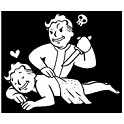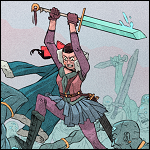|
Tell that DM he's being short sighted. For instance, when he refuses to tell you how beat up enemies look - that just takes away opportunities for both players and enemies; i.e. trying to fake out their opponents, or for players to not be able to really 'know' how hurt a ghost looks and thus misinterpret it. I have a story for both! In one campaign we thought a ghost looked much healthier than it actually was and my character chose a very heroic and ultimately suicidal thing to do. The other is that one high powered character had a ring that made him look like he never took injuries. While fighting an elder red dragon with the rest of the party, everyone but him died. He then tried to argue with it that it should let him take his companion's bodies away since fighting each other would never result in anything since he was immortal. The dragon decided to take a few more rounds fighting him and dropped him right as the DM said he was going to have it decide to stop bothering. i'm sure there's a million more possibilities!
|
|
|
|

|
| # ? May 30, 2024 19:46 |
|
To be clear, I’m not looking for advice on where to tell this guy to shove it (I’ve already talked with him about some of it), I’m hoping to get opinions on how much information the game is expecting players to have. This isn’t something I’ve ever really consciously thought about and have just been more-or-less copying what I’ve seen everyone else do.
|
|
|
|
I really think this might be the worst possible game to get caught up in questions about original intent. All sorts of stuff works contrary to intentions or doesn't work at all and requires a patchwork of DM intervention to get it going. I think a better thing to ask is whether obfuscating information makes the game more fun. The main advantage I can see to keeping rolls secret until after a Bard decides whether to Cutting Words is that Lore Bards are super powerful. But I think kneecapping a defining feature in pursuit of some nebulous balance probably isn't the way to go. Other kinds of secrecy I think should be played by ear. I like keeping the actual dice roll a secret because people can learn a little too much just by getting a feel for what modifiers are at work, but I'd much rather let the players know what the total attack roll is so Bards can Cutting Words, players know whether to cast Shield, and even just so I don't gently caress up and forget something modifying their armor class. "Does a 19 hit your AC" gives them a little to work with and imo is a lot more fun than a secret roll followed by "You take 8 piercing damage."
|
|
|
|
Guessing at enemy modifiers from looking at their rolls in combat is a very good and fun thing for players. You can even justify it from an RP perspective from the fact that experienced adventurers that they are, PCs should be able to get a measure of what they're facing after seeing an enemy in action.
|
|
|
|
FWIW I tend to be a lot more transparent during combat because it gives the players a better sense how they should be behaving in response to the battlefield conditions. People will beeline for the easy mark if you reveal that the AC is really low after the first hit, that sort of thing.
|
|
|
|
gradenko_2000 posted:FWIW I tend to be a lot more transparent during combat because it gives the players a better sense how they should be behaving in response to the battlefield conditions. People will beeline for the easy mark if you reveal that the AC is really low after the first hit, that sort of thing. I tend to let people figure out AC after a few attacks of just seeing what happens, but they get an idea from description. I fudge rolls all the time (weak dude gets surprise attacked by a bulette who crits and rolls near max damage, he would've been instant killed and the rest of the party would've probably been TPK'ed fighting it without their best damage dealer) and give descriptions of how monsters look for their relative health. I hide almost all of my rolls but will do some publicly for effect. That DM just sounds like a dick.
|
|
|
|
Re: How much should a DM tell players I'm pretty generous and I'll explain why. I base all my assumptions that the heroes the players are playing are all capable adventurers and combatants. They are experienced and have fought a variety of things. When I DM after the players have hit the enemy a few times or literally just touched the enemy AC I will just straight up tell them what the AC is. Rather than have them keep writing down AC hit numbers trying to figure stuff out which I find just tedious, both as a player and DM. This is because I believe it fits in with when you are in competition with something, you begin to notice their weakpoints (so playing hockey after you have played against a certain player you know if they are weak in certain areas, like a goaltender with a weak glove, or 5 hole). For HP I don't give out numbers, however, I do use a faux-bloodied mechanic. I loved bloodied in 4e because it was an in-game rule that forced the DM to provided players with reinforcement for whether or not they were genuinely hurting whatever they were fighting. So if an enemy is barely hurt with 3/4+ HP I say they look fine, or they took a hit or two but look unfazed. At ~ 1/2HP I say they have clearly been injured but still look like they could go on. If an enemy is at 1/4 or less HP I say they are hanging on but clearly looking injured and tired. If an enemy is within 1 attack from dropping I just straight up say one good attack looks like they could be killed. This provides visual context for the game of *~imagination~* when picturing the fight for both the players and myself. It allows players to think strategically about who they should be focusing on in order to take down the soonest. Again, player characters are professional combatants that know how to fight. My reasoning for being this specific with my HP thresholds comes from casually watching boxing and MMA. Even as a casual viewer you can tell when somebody is hurt bad, or exhausted, and looks like they are going to drop soon. Experienced fighters are going to be even better than we are at noticing this. I don't give out actual HP numbers because that's kind of lame. However, I feel fully justified in doing all the above. Additionally if one enemy is clearly the "boss" I will point that out to the PCs by saying saying it looks tougher, is clearly directing the other NPCs, poo poo like that. Unless, of course, the boss is trying to remain hidden. I should also point out that I am quite lucky in that people I play with will make sub-optimal decisions if it suites their character. Our pretty dumb barbarian will say "I'm just going after the biggest guy because it's what I do" and it works. Where other people in the party who fight smarter will play a more strategic game.
|
|
|
|
blastron posted:How much information are players expected to have about the game state during combat? I recently played a couple of Adventurer’s League games under a DM that hid absolutely everything he could in order to make combat harder. He wouldn’t tell us if a zombie had succeeded its save against Turn Undead until its turn, we couldn’t ask how beat up an enemy was looking (because bloodied was a 4e thing, you see), pulled minis off the table when they were invisible but not hiding, and so on. This is obviously pulling way too hard in that direction, but it really started me thinking about things. I'm honestly not against any of these besides bloodied. Invisible enemies having their mini's removed is great, because you start trying to find them using various tricks and it's fun to discover they've snuck behind your lines, or are beating feet in the opposite direction. Knowing whether enemies saved or not depends on the context. Knowing an enemy avoided Hold Person should be pretty obvious, but I had a GM hide that from us to good effect. In that case, it was a mind reader and pretended the spell worked on it until we got closer. In other cases, it doesn't make a lot of sense for players to not know something is stuck in a Web spell. It would be pretty clear they're physically stuck. The bloodied/injured thing would be the only thing I'd argue against. Knowing something is bloodied is perfectly reasonable unless it's so alien you'd have no way to guess at its anatmoy. It also makes sense to know something is barely standing or grievously hurt based on missing limbs, bleeding out, labored breathing, limping, etc...
|
|
|
|
I don't know if this is a thing in 5e at least, but I remember seeing something in PF I think that would let you fool people who used enchantment/compulsion things on you and make them think you failed when you didn't, implying that normally you know if that worked or not. I could be misremembering, though.
|
|
|
|
With my players I'll usually roll attack rolls be public, but things that they are trying that may not have an obvious success/fail result I'll keep a secret, or if they knew they failed would change their behavior
|
|
|
|
Roland Jones posted:I don't know if this is a thing in 5e at least, but I remember seeing something in PF I think that would let you fool people who used enchantment/compulsion things on you and make them think you failed when you didn't, implying that normally you know if that worked or not. I could be misremembering, though. Master Spy, Fool Casting: A master spy of 8th level or higher can trick an opponent into believing that she has been charmed or dominated. [...] To the caster, it appears that the spy failed her saving throw, but the spy is not under the caster’s control. If the spell provides a telepathic link, it functions normally, but the spy is under no obligation to follow the caster’s commands. Enchantment Foil: [...] Furthermore, you can choose to act as if you had failed your saving throw. If you do so, you gain a +20 bonus on Bluff checks to convince others that you failed your save and are under the enchantment’s effects. A creature that attempts to use magic to detect this ruse or to make you speak truthfully about it must succeed at a caster level check (DC 15 + your caster level) to do so. Further on the Pathfinder front: blastron posted:He wouldn’t tell us if a zombie had succeeded its save against Turn Undead until its turn,
|
|
|
|
Elysiume posted:There are a few options for that in PF. I'm probably forgetting some, but these two come to mind: Gotcha, thanks. I knew I saw something like that in Starfinder, which is why I was a bit confused, since I wasn't sure if my memories of a PF version as well were just me thinking of the SF thing and applying it to the wrong game.
|
|
|
|
I think a lot of DMs go way overboard in hiding information that the PCs really should know. Like, hiding AC/defenses. Should the PC know how much difficulty they're having fighting the monster? OF COURSE. There's a million things that the character should obviously be aware of that the actual human player won't be: exactly how the enemy is dodging, how they react to feints, how quickly they try to strike, etc. etc. etc. etc. All that stuff is abstracted into the monster's stats, and hiding that from the player is basically saying that the PC is an idiot fighting with their eyes closed. The rules and stats are the way we communicate the state of the game world to the players, and hiding that information is grossly unrealistic.
|
|
|
|
Tendales posted:I think a lot of DMs go way overboard in hiding information that the PCs really should know. Like, hiding AC/defenses. Should the PC know how much difficulty they're having fighting the monster? OF COURSE. There's a million things that the character should obviously be aware of that the actual human player won't be: exactly how the enemy is dodging, how they react to feints, how quickly they try to strike, etc. etc. etc. etc. All that stuff is abstracted into the monster's stats, and hiding that from the player is basically saying that the PC is an idiot fighting with their eyes closed. Simulationist design will always fail at it's own goals.
|
|
|
|
Removing the minis of Invisible units is probably a bad idea because Invisibility doesn't do what a lot of people assume. 99% of the time you still know EXACTLY where an Invisible enemy is. Unless they use an Action to Hide. Which Invisibility would let them do even out in the open, assuming their target doesn't just have a way to see Invisible anyway. Now yes the character would have disadvantage to hit an invisible enemy, but they would still know exactly where they are unless they are using actions to hide. Even if invisibility remains after attacking, such as from greater invisibility, the enemy would still need to spend another action to Hide after attacking. Now if it was an Invisible Goblin, or other creature who can Hide as a Bonus Action that might make things a bit more difficult. And there may be some question if an enemy is benefiting from both Invisibility and Silence.
|
|
|
|
Drape a little tissue with eyeholes cut out over invisible creatures like they're scooby-doo ghosts.
|
|
|
|
Curse of Strahd I just got finished playing it a while ago. We had a lot of fun doing it, and it took us a long rear end time to complete it. I liked that it had a pretty good through line, and there were plenty of hooks, and places to explore. It is rather easy to kind of wander off course because you catch wind of a hook, and get eaten alive by something way above your pay grade. I enjoyed it though, it was the first module my group played, and it made us really want to play the other ones. I don't think we'll get the same play life from Storm King's Thunder as we did CoS.
|
|
|
|
The one weird omnipresent GM habit that bothers me is way too many of them seem to demand a Deception roll for literally any lie. Even worse when it becomes contested. People will believe most things you tell them and most lies go unnoticed because your ordinary social situations don't call for skepticism. I try to only call for an actual roll if they're either trying to pass off some really unusual circumstance as how something happened or they're dealing with a person who has extrinsic reasons to doubt the story. People are rubes and good lies lean on things that aren't easily falsified. Most lies shouldn't even require a DC5 unless they ask a person to break protocol. (And in those situations, the trickier part is often persuasion and not deception imo.) Nehru the Damaja fucked around with this message at 00:05 on Mar 31, 2018 |
|
|
|
Nehru the Damaja posted:The one weird omnipresent GM habit that bothers me is way too many of them seem to demand a Deception roll for literally any lie. Even worse when it becomes contested. People will believe most things you tell them and most lies go unnoticed because your ordinary social situations don't call for skepticism. I try to only call for an actual roll if they're either trying to pass off some really unusual circumstance as how something happened or they're dealing with a person who has extrinsic reasons to doubt the story. "Hi, we're JAck and Jill from up the hill!" *fails deception roll* I knew it! You're actually Bob and Jane from up the lane! Yeah, I think some DMs put way too much emphasis on skill checks. Especially with stuff like perception or investigation, I give my players the option to just take some extra time to look around and be thorough. If they're looking for something they know is hidden then yeah, a skill check is required, but generally looting a place? Nah. What's this thread's policy on checking out hokmebrew stuff like classes? I'm trying my hand at designing one for fun.
|
|
|
|
Panderfringe posted:What's this thread's policy on checking out hokmebrew stuff like classes? I'm trying my hand at designing one for fun. But don't be surprised when some people spaz out and jump on their favorite 5e hobby horse issues.
|
|
|
|
Nehru the Damaja posted:The one weird omnipresent GM habit that bothers me is way too many of them seem to demand a Deception roll for literally any lie. Even worse when it becomes contested. People will believe most things you tell them and most lies go unnoticed because your ordinary social situations don't call for skepticism. I try to only call for an actual roll if they're either trying to pass off some really unusual circumstance as how something happened or they're dealing with a person who has extrinsic reasons to doubt the story. If I were to ever DM, I’d probably try to handle checks differently than it seems most tables do. No crit fails/successes on skill checks. (I know that’s already RAW, but crit fails/successes on skill checks seem like an exceptionally common house rule.) Having a range of outcomes in mind whenever possible, rather than binary pass/fail. A lot more reference to skill proficiencies, tool proficiences, languages and backgrounds to auto-succeed without a roll, or partially succeed even with a low one. And in concert, not allowing some rolls if they don’t have those things. And then there’s the whole “pass a deception check, two stealth checks, a perception check, a sleight of hand check, and an acrobatics check, if you fail once then you’re boned” nonsense. I know most of that isn’t really controversial here, but I see lots of discussions elsewhere that love crit fail/successes on skill checks, or multiple checks for “realism,” or whatever. I suspect that’s mostly because “wooooo roll them dice” and “isn’t it so hilarious when the expert rolls a 1 and does a pratfall!” but hey, whatever people find fun, go for it. For my taste, I’d rather set aside ultra-randomness, and instead use the character build to set a floor of competence.
|
|
|
|
Epi Lepi posted:I asked this a couple days ago and it didn't get a response. I searched the forums and some of the other posts about this adventure got me excited so I did end up ordering the book. So now I'm asking for any advice or things you wish you knew before running it. I used this guide while I was running Strahd and it was insanely helpful. Make sure you let the party know that there’s never any shame in running, but good luck getting them to ever try running. My players stubbornly refused to do anything but stand and fight and die over and over.
|
|
|
|
Mr. Humalong posted:I used this guide while I was running Strahd and it was insanely helpful. Make sure you let the party know that there’s never any shame in running, but good luck getting them to ever try running. My players stubbornly refused to do anything but stand and fight and die over and over. My recent players at least knew better. The round the Shambling Mound in Death House showed up they retreated on the spot. It appears they plan to go to Old Bonegrinder the next session because one of the artifacts is there, I have a feeling they will be running scared from the place.
|
|
|
|
MonsterEnvy posted:It appears they plan to go to Old Bonegrinder the next session because one of the artifacts is there, I have a feeling they will be running scared from the place. That place hosed us real hard. First time I remember fleeing a combat in the 5e hardcovers.
|
|
|
|
Does anyone here know of a module with the Yuan Ti and it was set on a island?
|
|
|
|
Hollismason posted:Does anyone here know of a module with the Yuan Ti and it was set on a island? Tomb of Annihilation is probably what you are thinking of. Though it's actually a peninsula
|
|
|
|
Hey guys, anyone got any cool ideas for weird/bad/fun magic items? I kind of set of a precedent giving my group weird stuff, and I'd like to field some more ideas. An example - I gave the gnome illusionist a ring that lets her talk to animals (it's 2e), but only animals she has eaten before. If she can convincingly come up with a dish on the fly, I allow it. Make a Con saving throw to see if you are salivating like the cartoon wolf through the conversation.
|
|
|
|
Firstborn posted:Hey guys, anyone got any cool ideas for weird/bad/fun magic items? I kind of set of a precedent giving my group weird stuff, and I'd like to field some more ideas. An example - I gave the gnome illusionist a ring that lets her talk to animals (it's 2e), but only animals she has eaten before. If she can convincingly come up with a dish on the fly, I allow it. Make a Con saving throw to see if you are salivating like the cartoon wolf through the conversation.
|
|
|
|
Cloak of levitation: sadly it's just the cloak levitates all the time, making it a bitch to actually put on.
|
|
|
|
Panderfringe posted:I gave one of my players a sentient sword who only ever criticizes her and tells her to commit small, petty crimes. talking weapons are really underused in modern D&D, it's a real shame.
|
|
|
|
I gave my group a special box with a tiny albino troll inside. If activated, there was a flash of burning magnesium and a shriek from inside the box as the light reflected from the outside world burnt itself on his skin, which was promptly shed and fed out of the box. It was a Polaroid-style camera with gruesome ethical implications.
|
|
|
|
MonsterEnvy posted:Tomb of Annihilation is probably what you are thinking of. Though it's actually a peninsula Nah this is a module from the 80s , I just can't remember the name .
|
|
|
|
This? It's not on an island though... https://en.wikipedia.org/wiki/Dwellers_of_the_Forbidden_City
|
|
|
|
Trickster's Deck - a deck of playing cards. On a successful roll a card in the owner's hand will inconspicuously change into whatever other card they want it to. On a fail it will change VERY conspicuously, with a puff of smoke and confetti, maybe a little fanfare. Similarly, Trickster's Dice will roll whatever numbers you want them to, but failing the roll means they make a drumroll when you throw them. You're not rolling to cheat, you're rolling to suppress the special effects. Dr Snofeld fucked around with this message at 13:39 on Mar 31, 2018 |
|
|
|
So I cracked open the actual Princes of the Apocalypse book after only reading the adventure league one or whatever. Whoa! The way it's presented is so different. I'm not even sure if I like it better than the tease that the incomplete one offers. When I thought I understood this adventure (fan of the old one), boy oh boy. The emphasis of certain events is completely shifted. Any tips for running this near the beginning? My party is around the point where they have wrung out the townsfolk for info and I have an NPC wizard I reskinned ready to give some info. I want to send them maybe into the sinkhole, but give them a small infodump first to remind them of what's going on. I actually kind of like the random breadcrumb adventures, though. Hunting a manticore with an order of fluffy knights sounds so cool. Firstborn fucked around with this message at 14:19 on Mar 31, 2018 |
|
|
|
MonsterEnvy posted:My recent players at least knew better. The round the Shambling Mound in Death House showed up they retreated on the spot. What really confused me is they ran from the mound, but then decided to take on the hags. Then three of them decided to visit the mayor guy and tell him to stop holding festivals while inside his house. Then instead of trying to talk their way out of it the bard used shatter and murdered the mayor. I told them multiple times “after casting shatter you destroyed the window that leads out of the room” but they decided to stay and try to fight and they died. 
|
|
|
|
What about a mirrored shield that grants advantage on charisma saves as the wielder is too busy checking their reflection to notice the effects. Or a few levels later a large "throwing" shield that can fly under concentration, controlled by bonus actions to attack, defend, or carry one small to medium sized creature. For arcane casters an infernal pen that replaces any ink requirements for spell components with the casters blood but requires a DC10 con save to avoid taking 1 damage for every 10GP worth of inks. Can also be used once to write up a binding contract that instantly forfeits the soul of anyone who signs it then breaks the agreement.
|
|
|
|
Hollismason posted:Nah this is a module from the 80s , I just can't remember the name . X1 Isle of Dread?
|
|
|
|
Mr. Humalong posted:I used this guide while I was running Strahd and it was insanely helpful. Make sure you let the party know that there’s never any shame in running, but good luck getting them to ever try running. My players stubbornly refused to do anything but stand and fight and die over and over. This looks really useful, thanks.
|
|
|
|

|
| # ? May 30, 2024 19:46 |
|
Epi Lepi posted:I asked this a couple days ago and it didn't get a response. I searched the forums and some of the other posts about this adventure got me excited so I did end up ordering the book. So now I'm asking for any advice or things you wish you knew before running it. I wish I had remembered to look up traveling speeds for groups, to determine how long it would take them to go from location to location, instead of just rolling for encounters and having my players just sit there while I look up what they found. Then after they had the encounter, they were just instantly there. Take information about your character"s backstory, religion, etc and work it into your decisions. How would some npcs react to a cleric of Lathander? How would a necromancer work in Barovia? You dont have to overdo it, but having a rough idea how npcs react to each character, based not on conversations, but the players themselves. Also, read the book twice before you run it. Players will surprise you and they might end up in Krezk before Barovia.
|
|
|







































